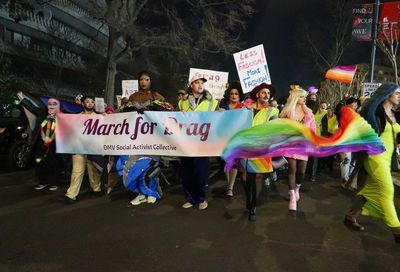Idaho’s Trans Health Care Ban Remains Blocked
The 9th Circuit refuses to overturn judge's order blocking state officials from prosecuting doctors who treat transgender youth.

The 9th U.S. Circuit Court of Appeals has refused to stay a lower court’s preliminary injunction blocking Idaho from enforcing its ban on gender-affirming care for minors.
On January 30, a three-judge panel of the appellate court rejected the state’s appeal of Judge B. Lynn Winmill’s December 26 order, which blocks state officials from prosecuting or revoking the licenses of doctors who treat transgender patients.
The law, known as HB 71, signed by Republican Gov. Brad Little last year, prohibits doctors from prescribing treatments that assist in a gender transition, such as puberty blockers, hormone replacement therapy, or gender confirmation surgery, to anyone under the age of 18.
Doctors who violate the law can be subjected to fines of up to $5,000, risk the revocation of their medical license, and be convicted of a felony, which would earn them a prison sentence of up to 10 years.
The American Civil Liberties Union and two families of transgender youth — going by the pseudonyms Pam Poe and Jane Doe — sued to block the law, arguing it is unconstitutional. After hearing the plaintiffs’ arguments, Winmill issued the injunction to block enforcement of the law while the case worked its way through the legal system.
In his ruling, issued just days before the law was to take effect on January 1, Winmill found that the families of the trans youth were likely to prevail in proving the law to be discriminatory and unconstitutional.
He also expressed skepticism about the arguments the law’s proponents put forth about the law’s necessity.
“The State’s goal in passing [the challenged Act] was not to ban a treatment. It was to ban an outcome that the State deems undesirable,” Winmill wrote.
Idaho Attorney General Raúl Labrador subsequently filed a motion asking the court to lift the injunction while he appealed Winmill’s decision to the 9th Circuit. But on January 16, Winmill rejected Labrador’s request to “stay” his order and allow the law’s provisions to take effect.
With the appeals court’s decision, Winmill’s injunction remains intact and the youth plaintiffs in the case, who had already begun gender-affirming treatments, can continue to receive that care — and will continue to do so, until either a higher court reverses Winmill’s decision or the law is struck down or upheld on its merits.
Lawyers for the plaintiffs celebrated the decision, leaving the status quo in place — at least for now.
“This ruling should be celebrated by everyone who decries discrimination,” Paul Carlos Southwick, the legal director of the ACLU of Idaho, said in a statement. “We celebrate alongside transgender youth and their families throughout Idaho who will continue to have access to the health care they need and deserve.”
Support Metro Weekly’s Journalism
These are challenging times for news organizations. And yet it’s crucial we stay active and provide vital resources and information to both our local readers and the world. So won’t you please take a moment and consider supporting Metro Weekly with a membership? For as little as $5 a month, you can help ensure Metro Weekly magazine and MetroWeekly.com remain free, viable resources as we provide the best, most diverse, culturally-resonant LGBTQ coverage in both the D.C. region and around the world. Memberships come with exclusive perks and discounts, your own personal digital delivery of each week’s magazine (and an archive), access to our Member's Lounge when it launches this fall, and exclusive members-only items like Metro Weekly Membership Mugs and Tote Bags! Check out all our membership levels here and please join us today!

























You must be logged in to post a comment.